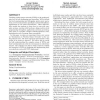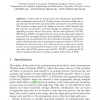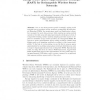1367 search results - page 164 / 274 » Hypercube-based Data Gathering in Wireless Sensor Networks |
ITICSE
2010
ACM
14 years 10 months ago
2010
ACM
Teaching wireless sensor networks (WSNs) at the undergraduate level is both challenging and rewarding. WSNs include low-level programming and debugging, power-aware operations, no...
100
click to vote
FORTE
2010
14 years 11 months ago
2010
Wireless sensor networks are typically ad-hoc networks of resource-constrained nodes; in particular, the nodes are limited in power resources. It can be difficult and costly to rep...
CONCURRENCY
2010
14 years 10 months ago
2010
Communication through relay channels in wireless sensor networks can create diversity and consequently improve robustness of data transmission for ubiquitous computing and network...
ALGOSENSORS
2008
Springer
14 years 12 months ago
2008
Springer
In this work we present three new distributed, probabilistic data propagation protocols for Wireless Sensor Networks which aim at maximizing the network's operational life and...
101
click to vote
EWSN
2010
Springer
15 years 4 months ago
2010
Springer
Due to non-homogeneous spread of sunlight, sensing nodes typically have non-uniform energy profiles in rechargeable Wireless Sensor Networks (WSNs). An energy-aware work load dist...



